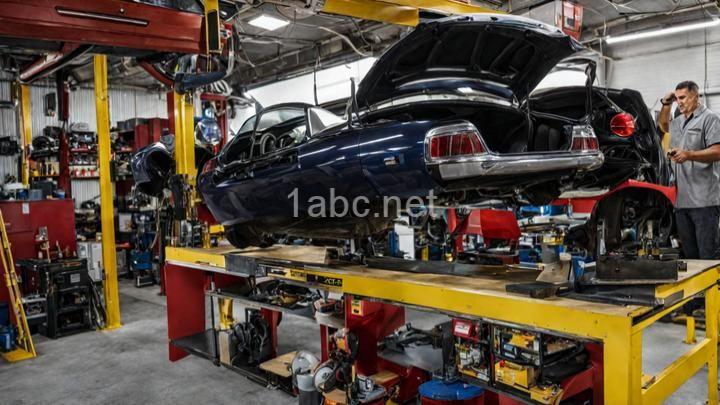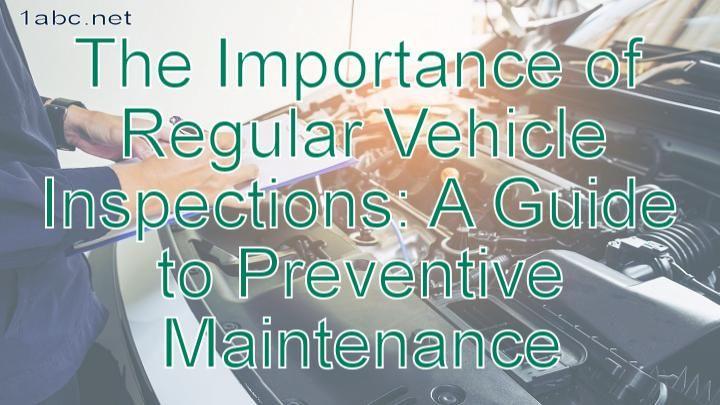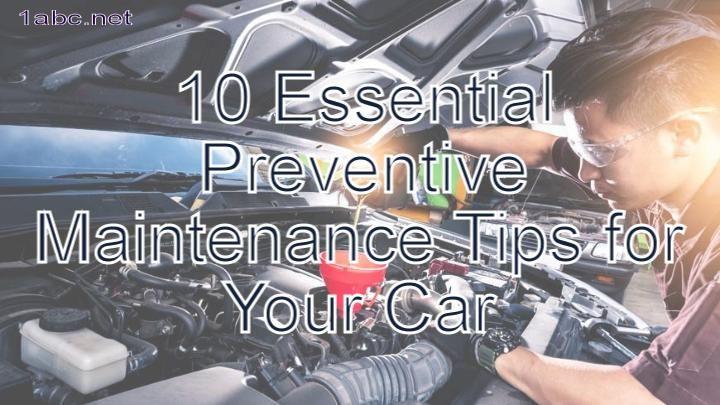10 Essential Auto Repair Tips for Long-Lasting Car Performance

Introduction:
Hey there, car enthusiasts! Are you ready to give your beloved ride the TLC it deserves? We all know how important regular auto repairs are for keeping our cars in top-notch condition. That's why we've compiled a list of 10 essential auto repair tips to help ensure long-lasting car performance. So let's dive in and give our four-wheeled companions the care they need!
1. Regular Oil Changes:
First things first, let's talk about the lifeblood of your engine – oil. Regular oil changes are crucial for maintaining engine health and prolonging the life of your car. It's recommended to follow the intervals specified by your car's manufacturer. Checking your oil levels regularly is also a quick tip to ensure your engine stays properly lubricated.
2. Keep an Eye on Tire Pressure:
Proper tire pressure is not only essential for your safety but also for fuel efficiency. Make sure to check your tire pressure regularly using a tire pressure gauge. The recommended range can usually be found in your car's manual or inside the driver's side door. And here's a bonus tip: don't forget to rotate your tires periodically to ensure even wear and better performance.
3. Brake Maintenance:
Your brakes play a crucial role in keeping you safe on the road. Regular brake maintenance is essential for optimal performance. Keep an eye out for signs of brake wear, such as squeaking or grinding noises, and seek professional assistance if needed. You can also perform some DIY brake maintenance, like inspecting brake pads and cleaning rotors.
4. Air Filter Replacement:
A clean air filter is vital for engine performance and fuel efficiency. Depending on your driving conditions, it's recommended to replace your air filter at regular intervals. You can find these intervals in your car's manual. If you're feeling adventurous, replacing the air filter yourself is a relatively simple task. Just follow the step-by-step instructions provided in your car's manual.
5. Regular Battery Check-ups:
No one likes unexpected breakdowns, especially due to a dead battery. Inspecting your battery regularly is a simple yet crucial step to avoid such situations. Keep an eye out for signs of battery failure, such as slow cranking or dimming headlights. You can test your battery's condition using a multimeter or voltmeter. And don't forget, avoiding excessive power usage when your car is parked can help extend your battery's life.
6. Cooling System Maintenance:
A properly functioning cooling system is essential for preventing engine overheating. Routine checks, such as inspecting coolant levels, radiator condition, and fan functionality, can go a long way in maintaining your cooling system's health. Oh, and here's a useful tidbit – make sure to use the right coolant for your specific vehicle. Consult your car's manual or a professional for guidance.
7. Spark Plug Replacement:
Spark plugs may be small, but they play a big role in efficient engine combustion and power delivery. Keep an eye out for signs of worn-out spark plugs, such as misfires or decreased fuel efficiency. When it's time for replacement, fear not – changing spark plugs yourself is a relatively straightforward process. Just follow the step-by-step guide provided in your car's manual.
8. Transmission Fluid Service:
Proper maintenance of your transmission fluid is crucial for smooth shifting and prolonged transmission life. The recommended intervals for transmission fluid changes or flushes can vary, so it's best to consult your car's manual. For more complex transmission servicing, it's always a good idea to seek professional assistance.
9. Regularly Inspect Belts and Hoses:
Belts and hoses are unsung heroes in your car's various systems, such as the cooling system and power steering. Visually inspecting belts and hoses for wear, cracks, or leaks is an important step in preventing potential issues. Replace them as recommended by your car's manufacturer to ensure optimal performance and avoid unexpected breakdowns.
1
0. Listen to Your Car:
Last but certainly not least, always listen to what your car has to say. Pay attention to any unusual sounds or sensations it might be making. Your car might be trying to tell you something! Common warning signs, such as strange noises, vibrations, or dashboard warning lights, could indicate potential issues. When in doubt or concerned, don't hesitate to seek professional help.
Conclusion:
By following these 10 essential auto repair tips, you'll not only keep your car running smoothly but also ensure its longevity. So go ahead, give your ride some love – it deserves it! Remember, regular maintenance and a little TLC go a long way in keeping your car performing at its best. Don't forget to share your own auto repair experiences or leave any questions or comments below. Happy driving!
FREQUENTLY ASKED QUESTIONS
What are the 10 essential auto repair tips for long-lasting car performance?
When it comes to maintaining the long-lasting performance of your car, there are several essential auto repair tips to keep in mind. Here are ten tips that can help you ensure your car stays in top shape:
-
Regularly Check Fluid Levels: Keep an eye on your car's oil, coolant, brake fluid, and transmission fluid levels. Regularly checking and topping up these fluids can prevent damage and ensure smooth operation.
-
Change Oil and Filters: Regularly changing your car's oil and filters is crucial for engine health. It helps remove dirt and contaminants, ensuring optimal performance and longevity.
-
Inspect and Replace Belts and Hoses: Over time, belts and hoses can wear out or become damaged. Regularly inspecting them and replacing them as needed can prevent breakdowns and costly repairs.
-
Check Tire Pressure and Alignment: Properly inflated tires and aligned wheels not only improve fuel efficiency but also extend the life of your tires. Regularly check tire pressure and alignment to ensure optimal performance and safety.
-
Maintain Battery Health: Keeping your car's battery in good condition is essential. Clean the terminals regularly, check the battery's charge level, and replace it when necessary to avoid unexpected breakdowns.
-
Replace Worn Brake Pads: Brake pads wear out over time, so it's important to replace them before they become completely worn down. This ensures your brakes work effectively and prevents damage to other parts of the braking system.
-
Regularly Inspect and Replace Spark Plugs: Faulty spark plugs can lead to decreased fuel efficiency and engine misfires. Regularly inspecting and replacing spark plugs can improve performance and prevent potential issues.
-
Maintain a Clean Air Filter: A dirty air filter restricts airflow to the engine, reducing performance and fuel efficiency. Regularly clean or replace the air filter to ensure optimal engine performance.
-
Keep an Eye on the Cooling System: A properly functioning cooling system is crucial for preventing overheating. Regularly check the coolant level, inspect hoses for leaks, and ensure the radiator is clean.
-
Follow Manufacturer's Maintenance Schedule: Lastly, always refer to your car's manufacturer maintenance schedule. It will provide specific guidelines on when to perform routine maintenance tasks and inspections.
By following these ten essential auto repair tips, you can help ensure your car performs at its best and lasts for years to come. Remember, regular maintenance is key to avoiding costly repairs and keeping your car running smoothly.
How often should I change my car's oil to maintain optimal performance?
To maintain optimal performance of your car, it is generally recommended to change your car's oil every 3,000 to 5,000 miles or every 3 to 6 months, whichever comes first. However, it is important to check your car's owner's manual for the manufacturer's specific recommendations, as they may vary depending on the make and model of your vehicle. Regular oil changes help to ensure that your engine remains properly lubricated, prevents the buildup of harmful deposits, and extends the life of your car's engine. By following the recommended oil change intervals, you can help keep your car running smoothly and maintain its performance. Remember to also consider your driving conditions, as harsher conditions such as extreme temperatures or frequent stop-and-go traffic may require more frequent oil changes. If you have any further questions about maintaining your car's performance, feel free to ask!
Is it necessary to replace the air filter in my car regularly?
Yes, it is necessary to replace the air filter in your car regularly. The air filter plays a crucial role in the functioning of your vehicle's engine. It helps to keep the air entering the engine clean and free from contaminants such as dust, pollen, and debris. Over time, the air filter can become clogged and dirty, which can restrict the airflow and negatively impact the engine's performance. Regularly replacing the air filter ensures that your engine receives clean air, allowing it to function optimally and avoid potential damage. It is recommended to consult your car's manufacturer guidelines or a professional mechanic to determine the appropriate replacement interval for your specific vehicle.
How can I maintain the proper tire pressure to ensure my car's performance?
To maintain the proper tire pressure and ensure optimal performance for your car, there are a few key steps you can follow:
-
Check your tire pressure regularly: It's important to monitor your tire pressure at least once a month, as well as before long trips or when the weather changes significantly. You can do this easily with a tire pressure gauge, which can be purchased at most auto parts stores.
-
Find the recommended pressure: The ideal tire pressure for your car can usually be found in the owner's manual or on a sticker inside the driver's side door jamb. It's essential to inflate your tires to the recommended pressure, as overinflation or underinflation can negatively impact your car's performance and safety.
-
Inflate or deflate as needed: If your tires are underinflated, use an air compressor to add air until they reach the recommended pressure. On the other hand, if they are overinflated, you can release some of the air by gently pressing the valve stem with a small tool or the tip of a pen. It's crucial to make small adjustments and recheck the pressure to avoid going below or above the recommended range.
-
Be mindful of temperature changes: Tire pressure can fluctuate with temperature changes, so it's essential to keep this in mind when checking and adjusting your tire pressure. As temperatures drop, tire pressure tends to decrease, while warmer temperatures can cause an increase. Adjustments may be necessary to maintain the proper pressure in different weather conditions.
-
Don't forget the spare tire: It's easy to overlook the spare tire, but it's just as important to ensure it has the proper pressure. Check it periodically and make sure it's inflated to the recommended level in case you need to use it in an emergency.
By following these steps and staying vigilant about maintaining the proper tire pressure, you can optimize your car's performance, fuel efficiency, and overall safety on the road.




